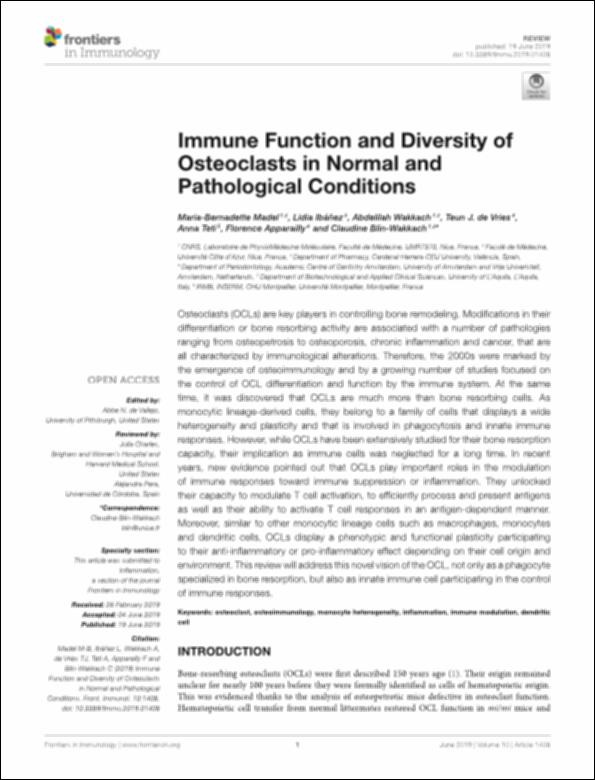Por favor, use este identificador para citar o enlazar este ítem:
http://hdl.handle.net/10637/10845Immune function and diversity of Osteoclasts in normal and pathological conditions
| Título : | Immune function and diversity of Osteoclasts in normal and pathological conditions |
| Autor : | Madel, Maria-Bernadette Ibáñez Torres, Lidia Wakkach, Abdelilah De Vries, Teun J. Teti, Anna Apparailly, Florence Blin-Wakkach, Claudine |
| Materias: | Immune response.; Inmunorrespuesta.; Huesos - Inmunología.; Osteoclastos.; Sistema inmune.; Bones - Immunology.; Células dendríticas.; Dendritics cells.; Immune system.; Osteoclasts. |
| Editorial : | Frontiers Media |
| Citación : | Madel, MB., Ibáñez, L., Wakkach, A., De Vries, TJ., Teti, A., Apparailly, F. et al. (2019). Immune function and diversity of Osteoclasts in normal and pathological condition. Frontiers in Immunology, vol. 10, art. 1408 (19 jun.). DOI: https://doi.org/10.3389/fimmu.2019.01408 |
| Resumen : | Osteoclasts (OCLs) are key players in controlling bone remodeling. Modifications in their differentiation or bone resorbing activity are associated with a number of pathologies ranging from osteopetrosis to osteoporosis, chronic inflammation and cancer, that are all characterized by immunological alterations. Therefore, the 2000s were marked by the emergence of osteoimmunology and by a growing number of studies focused on the control of OCL differentiation and function by the immune system. At the same time, it was discovered that OCLs are much more than bone resorbing cells. As monocytic lineage-derived cells, they belong to a family of cells that displays a wide heterogeneity and plasticity and that is involved in phagocytosis and innate immune responses. However, while OCLs have been extensively studied for their bone resorption capacity, their implication as immune cells was neglected for a long time. In recent years, new evidence pointed out that OCLs play important roles in the modulation of immune responses toward immune suppression or inflammation. They unlocked their capacity to modulate T cell activation, to efficiently process and present antigens as well as their ability to activate T cell responses in an antigen-dependent manner. Moreover, similar to other monocytic lineage cells such as macrophages, monocytes and dendritic cells, OCLs display a phenotypic and functional plasticity participating to their anti-inflammatory or pro-inflammatory effect depending on their cell origin and environment. This review will address this novel vision of the OCL, not only as a phagocyte specialized in bone resorption, but also as innate immune cell participating in the control of immune responses. |
| Descripción : | Este es el artículo que se ha publicado de forma definitiva en: https://www.frontiersin.org/articles/10.3389/fimmu.2019.01408/full |
| URI : | http://hdl.handle.net/10637/10845 |
| Derechos: | http://creativecommons.org/licenses/by/4.0/deed.es |
| ISSN : | 1664-3224 (Electrónico). |
| Fecha de publicación : | 19-jun-2019 |
| Centro : | Universidad Cardenal Herrera-CEU |
| Aparece en las colecciones: | Dpto. Farmacia |
Los ítems de DSpace están protegidos por copyright, con todos los derechos reservados, a menos que se indique lo contrario.


